- Home
- Charles Bukowski
What Matters Most Is How Well You Walk Through the Fire Page 15
What Matters Most Is How Well You Walk Through the Fire Read online
Page 15
“come on, chicken,” she laughs and we go in
and stand with the icecream people.
none of them are cursing or threatening
the clerks.
there seem to be no hangovers or
grievances.
I am alarmed at the placid and calm wave
that flows about. I feel like a leper in a
beauty contest. we finally get our sundaes and
sit in the car and eat them.
I must admit they are quite good. a curious new
world. (all my friends tell me I am looking
better. “you’re looking good, man, we thought you
were going to die there for a while…”)
—those 4,500 dark nights, the jails, the
hospitals…
and later that night
there is use for the pecker, use for
love, and it is glorious,
long and true,
and afterwards we speak of easy things;
our heads by the open window with the moonlight
looking through, we sleep in each other’s
arms.
the icecream people make me feel good,
inside and out.
like a cherry seed in the throat
naked in that bright
light
the four horse falls
and throws a 112 pound
boy into the hooves
of 35,000 eyes.
good night, sweet
little
motherfucker.
3
the beads swing and the clouds obscure
the ordinary café of the world
new worlds shine in the dust
come up through the slums of the mind only
to choke on mosquito
ideas.
it’s most difficult
like eating a salad
in the ordinary café of the world;
it’s most difficult
to create art
here.
look about. the pieces to work with are
missing. they must be created or
found.
the critics should be generous and the critics are
seldom
generous.
they think it’s easy to
put out water with fire.
but there’s been no wasted effort
no matter what they’ve done
to us:
the critics
the lost women
the lost jobs,
damn them all anyhow
they’re hardly as interesting as
this ordinary café, this ordinary world,
we know there should be a better place,
an easier place,
but there’s not;
that’s our secret
and it’s not
much.
but it’s enough.
we have chosen the ordinary,
withering fire.
to create art means
to be crazy alone
forever.
on shaving
miraculous
to grow old
through the wars & the women
rainy nights
stubbed toes
toothaches
walls
landladies
jails
hospitals
nightmares
I only shave a little
under the nose &
a touch below each
cheekbone &
the neck
under the chin
the remainder remains—
hair & man
miraculous
to grow old
through the wars & the women
that I did not become a great boxer
with much courage
does not matter
even though it was my
desire
I look at my hands shaving
my face
& my nose is too long
my cheeks sag
my teeth are my own (though I suppose
half are missing)
& I’m aware of ghosts & spirits & clouds
& blood & weeping & skeletons &
much more
it’s warm tonight &
quiet while
shaving
& sometimes when I am ready to sleep &
I am upon my back
I think
yes
it’s all been very
nice
face up
hands by side
gliding through the
years
miraculous
to grow old
though the wars & the women
& not to murder it by
thinking
too much about
it all
rather,
letting it all be
whatever it was/is
shaving is something like
seeing yourself in a
movie
the cup of soap takes on a
gentleness & the brush & the
mirror too
miraculous
to grow old &
shave
all the years of agony
now
seem almost
unimportant
& to shave an old face
allows the thoughts to be
steady and kind like
the electric light
above the
mirror
I hear an airplane
overhead
& there’s a man flying
so high there
alone
making the sound
that comes through the ceiling and then
fades away
I listen to a dog barking
someplace in this
neighborhood & I
rinse the razor & place it behind
the mirror on the wall.
school days
I’m in bed.
it’s morning
and I hear:
where are your socks?
please get dressed!
why does it take you so long to
get dressed?
where’s the brush?
all right, I’ll give you a head
band!
what time is it?
where’s the clock?
where did you put the clock?
aren’t you dressed yet?
where’s the brush?
where’s your sandwich?
did you make a sandwich?
I’ll make your sandwich.
honey and peanut butter.
and an orange.
there.
where’s the brush?
I’ll use a comb.
all right, holler. you lost the brush!
where did you lose the brush?
all right. now isn’t that better?
where’s your coat?
go find your coat.
your coat has to be around somewhere!
listen, what are you doing?
what are you playing with?
now you’ve spilled it all!
I hear them open the door
go down the stairway,
get into the car.
I hear them drive away. they are gone,
down the hill
on the way to
nursery school.
neither a borrower nor a lender be
I’m at the racetrack every day
and he is too.
he used to be in the movie
industry.
I know him because somebody
I know knows him.
you know how that goes:
I really don’t know him.
anyway, day after day,
he sees
me.
he yells my name.
my last name.
I’ll shout a greeting
back.
once in a while there
will be a small
conversation, but not
much.
the other day
I was turning from the
window, money still
in hand, had made a
minor score, 20 win
on a horse that paid
$11.80 (that’s
one hundred eighteen
dollars)
and he was
standing
there.
“how you doing?”
he asked.
“I got lucky,”
I answered.
“I haven’t hit a
thing,” he said,
“been dropping
between 1500 and
two thousand a
day.”
“why don’t you
go home?” I asked.
“lay down and take
a rest?”
he put his hand
out.
in it was a quarter
and a
dime.
“I don’t have
enough for a
bet.
can you loan
me
something?
anything?”
it was the
6th race.
I hesitated,
then handed
him a
20.
“thanks, I’ll see
you tomorrow.”
and then he
was
gone.
although I did
see him after
the 6th race
his head was down
and he was
slowly
walking
along.
I moved off and
took a
seat.
I didn’t see him
any more that
day.
or the next.
or the
next.
or the next
week.
maybe he’s working
in the movie industry
again.
he’s a nicer guy
than most,
I almost like
him.
or maybe he’s still
at the track,
hiding out.
it’s embarrassing.
I don’t need the
20 that much.
they’ve been running
good.
and now I’m almost
afraid I’ll see him
out there.
it’s almost as if I was
in debt to
him.
Shakespeare had it
right.
sometimes even putting a nickel into a parking meter feels good—
precious grenades inside my skull,
I’d rather grow roses than nurture self-pity,
but sometimes it really begins to tell on me
and I have visions of house trailers and
hookers slipping into giant volcanic cracks
just south of Santa Barbara.
I guess what makes me feel better
are the truly sane: the motorcycle cop
in a clean uniform who gives me a ticket and
then rides away on two wheels like a man
who never had an itchy crotch.
or the Southern California Gas Company man
will ill-fitting dentures
who knocks on my door at 8:15 a.m. and
lights up the room with his piranha smile.
yes,
the real miracles are the thousands of tiny
people who know exactly what they are doing.
I used to look for inspiration in higher
places
but the higher you go
like to Plato or God
the less space there is in which to
stand.
check it out some day. you’re driving down
the street and there’s a guy hanging onto
the end of a hydraulic jack
sweat bathing his naked gut
his eyes slitted as his
body shakes and trembles
but he holds on as if to an ultimate truth, and
you smile and
you put it into second gear
check the rearview mirror and think,
yes, I can make it too, and you light a
cigarette with one hand
turn on the radio with the other
and let the good life roll along like
that.
Mahler
the phone rings and somebody says,
“hey, they made a movie about
Mahler. you ought to go see it.
he was as fucked-up as you are.”
the phone rings again. it’s
somebody else: “you ought to see
that Mahler movie. when you get high
you always talk about Mahler’s music.”
it’s true: I like the way
Mahler wandered about in his
music and still retained his
passion.
he must have looked like an
earthquake walking down the
street.
he was a gambler and he shot
the works
but I’d feel foolish
walking into a movie house.
I make my own
movies.
I am the best kind of German:
in love with the music
of a great Jew.
fellow countryman
at the track
heard the voice behind me,
“Hank…”
I turned and here was this
German youth,
maybe age 34,
needed a shave, beer on his
breath.
“I know you don’t like to
be bothered…but I have
this book…”
“all right, kid, look I have
to find a place…”
I took the book over to
a trash can, put it on
top, asked his name,
autographed it,
handed it back.
“I am shaking,” he
said.
“it’s all right,” I said,
“I’m just a horseplayer.”
“I’ve been looking for
you many days…”
“kid,” I said, “listen to
me, I can’t drink with you
or pal with you.
I have to leave
now.”
“oh, I understand,”
he said.
that was good.
I didn’t see him anymore
that day.
the next day I was
sitting alone in a small box
section.
then I heard a voice behind
me.
“hello, Hank,” it said.
I didn’t answer.
“who do you like in this
race?” he asked.
“I mean, out of all your
experience, who do
you like?”
I turned.
it was my friend of
yesterday.
he had another book
in his lap.
I recognized it.
it was full of photographs
and writing about one of
my trips to
Europe.
I grabbed him by the
throat, shook him a bit,
then took the book, ripped down
his pants, his shorts and
jammed the book up his
ass,
then I lifted him up over my
head,
carried him down to the
railing,
tossed him onto the
track
where the 6 horse
on post parade
stepped onto the middle of
his back.
his eyeballs
squirted out
and rolled around
looking for
Andernach
and I got up and
went to the bar
for a pretzel and a
beer.
the young man on the bus stop bench
he sits all day at the bus stop
at Sunset and Western
his sleeping bag beside him.
he’s dirty.
nobody bothers him.
people leave him alone.
the police leave him alone.
he could be the 2nd coming of Christ
but I doubt it.
the soles of his shoes are completely
gone.
he just laces the tops on
and sits and watches traffic.
I remember my own youthful days
(although I traveled lighter)
they were similar:
park benches
street corners
tarpaper shacks in Georgia for
$1.25 a week
not wanting the skid row church
hand-outs
too crazy to apply for relief
daytimes spent laying in public parks
bugs in the grass biting
looking into the sky
little insects whirling above my head
the breathing of white air
just breathing and waiting.
life becomes difficult:
being ignored
and ignoring.
everything turns into white air
the head fills with white air
and as invisible women sit in rooms
with successful bright-eyed young men
conversing brilliantly about everything
your sex drive
vanishes and it really
doesn’t matter.
you don’t want food
you don’t want shelter
you don’t want anything.

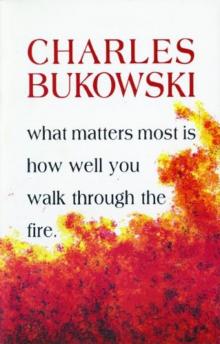 Burning in Water, Drowning in Flame
Burning in Water, Drowning in Flame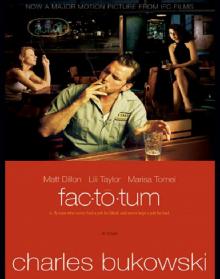 Factotum
Factotum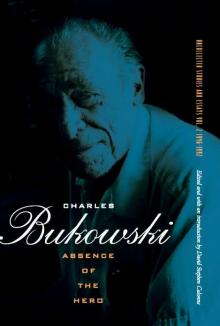 Absence of the Hero
Absence of the Hero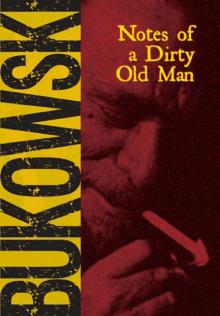 Notes of a Dirty Old Man
Notes of a Dirty Old Man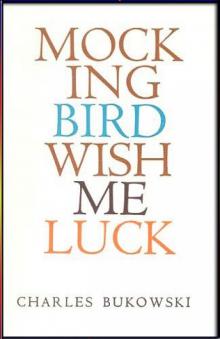 Mockingbird Wish Me Luck
Mockingbird Wish Me Luck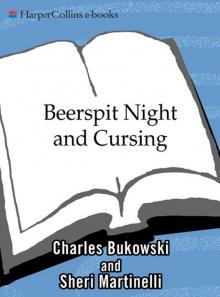 Beerspit Night and Cursing
Beerspit Night and Cursing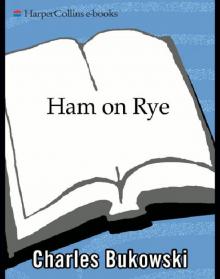 Ham on Rye: A Novel
Ham on Rye: A Novel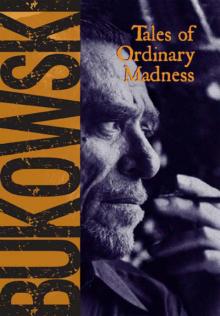 Tales of Ordinary Madness
Tales of Ordinary Madness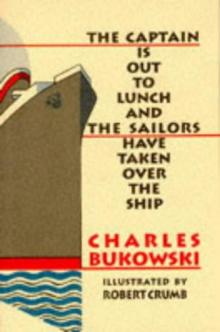 The Captain Is Out to Lunch and the Sailors Have Taken Over the Ship
The Captain Is Out to Lunch and the Sailors Have Taken Over the Ship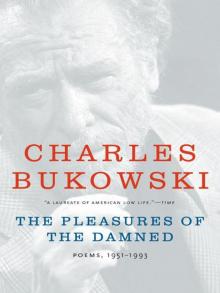 The Pleasures of the Damned
The Pleasures of the Damned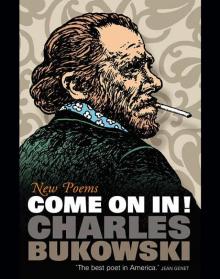 Come on In!
Come on In!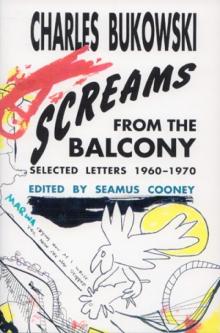 Screams From the Balcony
Screams From the Balcony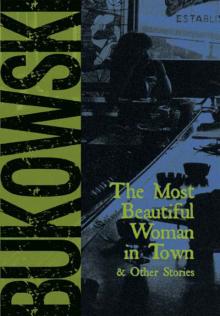 The Most Beautiful Woman in Town & Other Stories
The Most Beautiful Woman in Town & Other Stories New Poems Book 3
New Poems Book 3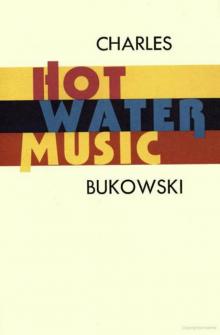 Hot Water Music
Hot Water Music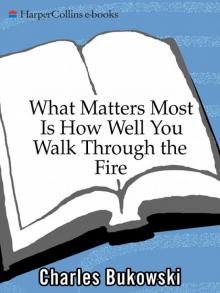 What Matters Most Is How Well You Walk Through the Fire
What Matters Most Is How Well You Walk Through the Fire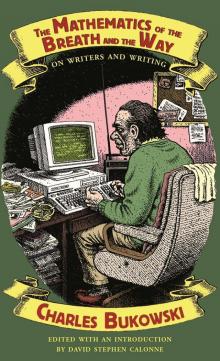 The Mathematics of the Breath and the Way
The Mathematics of the Breath and the Way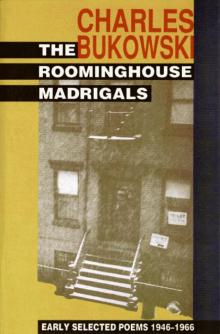 The Roominghouse Madrigals: Early Selected Poems, 1946-1966
The Roominghouse Madrigals: Early Selected Poems, 1946-1966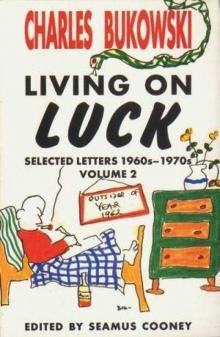 Living on Luck
Living on Luck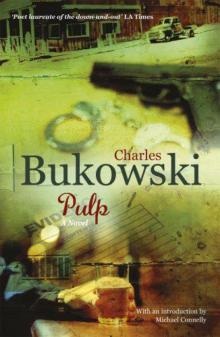 Pulp
Pulp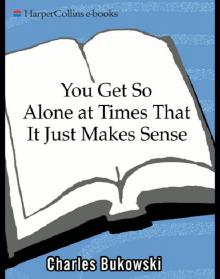 You Get So Alone at Times That It Just Makes Sense
You Get So Alone at Times That It Just Makes Sense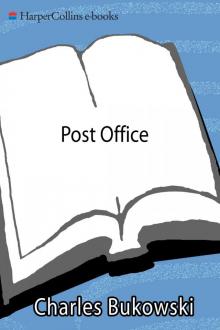 Post Office: A Novel
Post Office: A Novel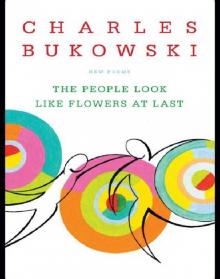 The People Look Like Flowers at Last: New Poems
The People Look Like Flowers at Last: New Poems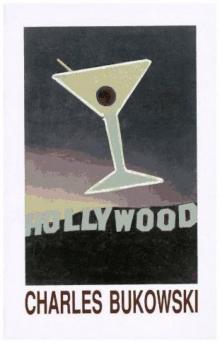 Hollywood
Hollywood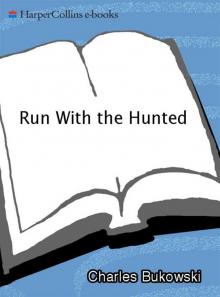 Run With the Hunted: A Charles Bukowski Reader
Run With the Hunted: A Charles Bukowski Reader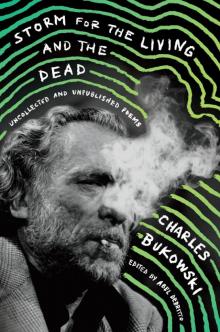 Storm for the Living and the Dead
Storm for the Living and the Dead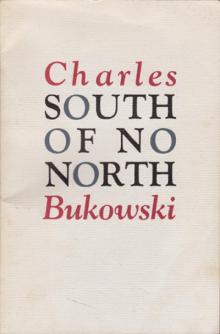 South of No North
South of No North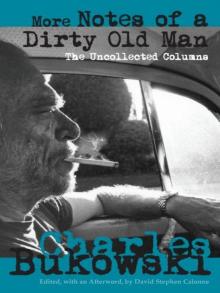 More Notes of a Dirty Old Man: The Uncollected Columns
More Notes of a Dirty Old Man: The Uncollected Columns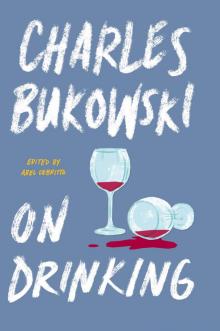 On Drinking
On Drinking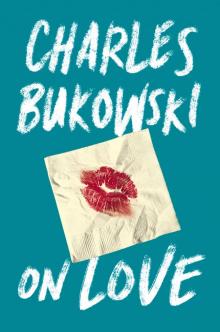 On Love
On Love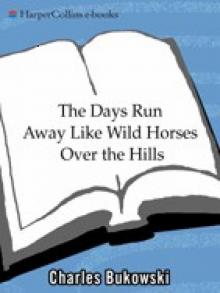 The Days Run Away Like Wild Horses
The Days Run Away Like Wild Horses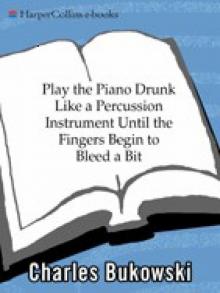 Play the Piano
Play the Piano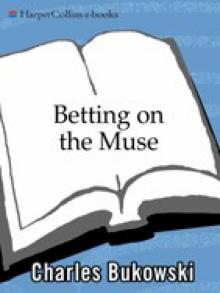 Betting on the Muse
Betting on the Muse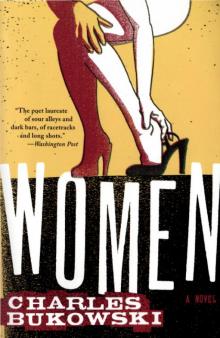 Women
Women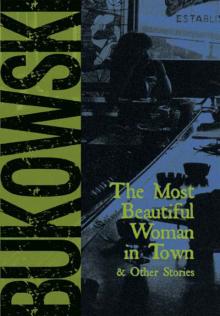 The Most Beautiful Woman in Town
The Most Beautiful Woman in Town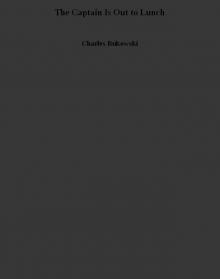 The Captain Is Out to Lunch
The Captain Is Out to Lunch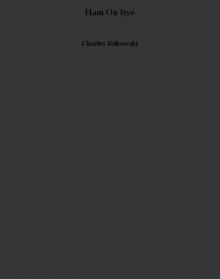 Ham On Rye
Ham On Rye New Poems Book Three
New Poems Book Three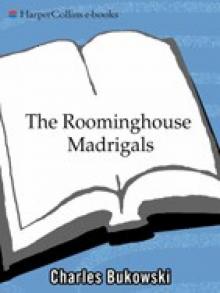 The Roominghouse Madrigals
The Roominghouse Madrigals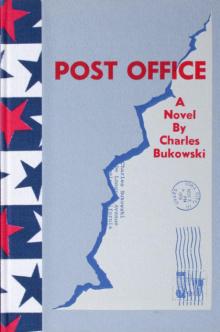 Post Office
Post Office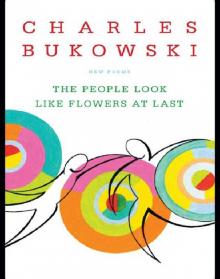 The People Look Like Flowers At Last
The People Look Like Flowers At Last